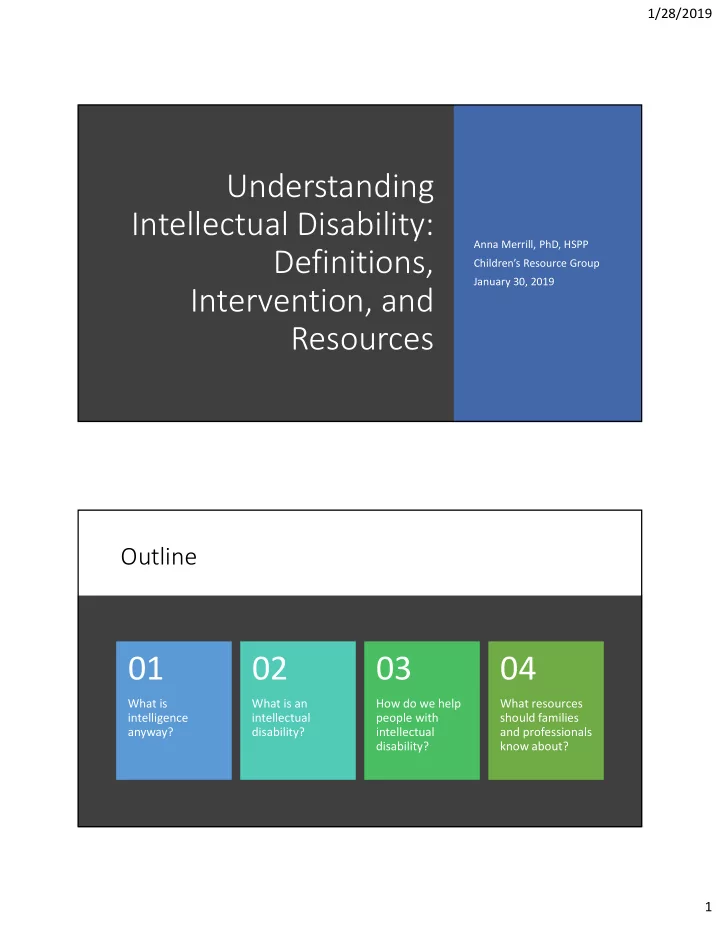

1/28/2019 Understanding Intellectual Disability: Anna Merrill, PhD, HSPP Definitions, Children’s Resource Group January 30, 2019 Intervention, and Resources Outline 01 02 03 04 What is What is an How do we help What resources intelligence intellectual people with should families anyway? disability? intellectual and professionals disability? know about? 1
1/28/2019 What is intelligence? Psychometric Social Biological Measured in a psychological Observable behaviors in specific The limit set by your genetics, evaluation using standardized contexts that lead to success determines the functioning of the testing, related to biology but (performance at work, academic brain influenced by context and culture achievement) Psychologist’s Definition of Intelligence • Ability to reason abstractly, solve complex problems, and acquire new knowledge 2
1/28/2019 Intellectual Disability The previous term for this diagnosis A disability categorized by was “mental retardation” significant difficulties in both • Intellectual Functioning • Thinking, learning, reasoning, *The disability originates problem-solving in childhood* • Adaptive Functioning • Every day social, conceptual, and practical skills The Distribution of Intellectual Functioning 3
1/28/2019 Adaptive Functioning: the skills needed to make it through every day life Conceptual: Social: Practical: Language, reading, Interpersonal Personal care, writing, math, reasoning, communication, organization, community memory friendships, leisure skills use 4
1/28/2019 Learning is more concrete, abstract concepts are difficult Passive learning is less likely What does Limited use of strategies for learning or problem-solving Intellectual Difficulty with thinking ahead and planning Disability look like? Slower processing or responding Difficulty with self-direction or internal motivation Difficulty generalizing things learned across people and places • Learning Disability = Learning Disorder = Learning Difference • Specific Learning Disorder • Significant difficulty in a specific academic area • Reading (Dyslexia) • Writing (Dysgraphia) • Math (Dyscalculia) • Measured through academic achievement How is Intellectual Disability testing, NOT IQ testing Different from a Learning Disability? 5
1/28/2019 The Psychological Evaluation Parent, Interview or Caregiver, Intake with Teacher Family Questionnaires Administration of Behavioral Standardized Observations Testing Psychological evaluation • Administration of an IQ test • WPPSI-IV, WISC-V, WAIS-IV • SB-5 • WJ-IV • DAS-II • Administered by a trained psychologist in a one-on-one setting • Can occur in a school or Measuring Cognitive clinical setting Functioning 6
1/28/2019 Measuring Adaptive Functioning • Parent, Caregiver, Teacher or the Individual Themselves complete a questionnaire • ABAS-3 • Vineland -3 • Typically includes rating how much support an individual needs across different skills • does not have skill, needs support or reminders, completely independent on that skill Parent, Interview or Caregiver, Intake with Teacher Family Questionnaires Administration of Behavioral Standardized Observations Testing Psychological evaluation ID Diagnosis 7
1/28/2019 Levels of Intellectual Disability • About 2/3 of cases of ID have an identified “cause” • Genetic disorders • Alcohol (FAS)/Lead exposure • Issues with pregnancy/delivery • Neurological disorders (epilepsy, CP) • This means about 1/3 of the time, we do not know why a child is born with an intellectual disability “Why did this happen to my • However, this does not typically change the course of treatment child?” 8
1/28/2019 Considerations in the Diagnosis of ID Community or Environmental Factors Cultural or Linguistic Factors Other disabilities that impact functioning (e.g. physical disabilities, blindness, deafness, other mental health diagnoses) Co-occurring Conditions Children with an • Neurodevelopmental Disorder intellectual disability • Mental Health Diagnosis are 3-4 times more • Psychiatric Condition likely to have another: • Autism Spectrum Disorder • Speech and language disorders Possible co-occurring • ADHD diagnoses include: • Anxiety or Mood disorders • Schizophrenia 9
1/28/2019 Intervention for Individuals with ID Visual supports in the environment to increase independence Use of schedules and routines How can we adjust the Allow more time for transitions, decrease transitions when possible environment and expectations to meet Repetition and reinforcement to learn new skills the individual’s needs? • Education of parents, Talk less, decrease stimulation in the environment siblings, teachers, clinicians • Establishing realistic expectations Infuse choice as frequently as possible Consideration of medication Make sure that Recognize that Establish a the individual the individual’s routine that is Always ask, “Am (and the needs, wants, or fulfilling to the I asking too caregivers!) are desires are not individual but much, too fast?” getting enough the same as not over sleep, nutrition, yours stimulating exercise Considerations for Intervention 10
1/28/2019 Resources The Arc of Indiana: https://www.arcind.org/ Family Voices Indiana: Resources - http://www.fvindiana.org/ General The American Association on Intellectual and Information Developmental Disabilities: http://aaidd.org/ The Association of University Centers on Disabilities: https://www.aucd.org • Tuesdays with Liz Web Series: https://www.youtube.com/playlist?list=PLEHWL7i0kECV8GSORs5 6oK7SP7GXHorOB 11
1/28/2019 Indiana First Steps: https://www.in.gov/fssa/ddrs/4685.htm Vocational Rehabilitation: https://www.in.gov/fssa/ddrs/2636.htm Resources – Bureau of Developmental Disabilities: Government https://www.in.gov/fssa/ddrs/2639.htm Agencies • Non-income based financial supports: • Family Support Waiver – a set amount of money that can be used to pay for therapies, case management, respite, transportation, adult day services, etc., must apply, there is a waitlist • Community Integration and Habilitation Waiver – money reserved for individuals deemed to have priority status due to circumstances such as death of a caregiver, evidence of abuse/neglect, or evidence of an extreme health/safety risk Indiana Office of Special Education: https://www.doe.in.gov/specialed • Coffee Talk on YouTube regarding the Certificate of Completion: https://www.youtube.com/watch?v=Q44eTf4cv- 8&feature=youtu.be Resources - • Three Pathways to Graduation: Education https://www.doe.in.gov/graduation-pathways INSOURCE: http://insource.org/ The Council for Exceptional Children: https://www.cec.sped.org/ 12
1/28/2019 Guardianship/Supported Decision Making – legal process in which a person is appointed to support, or be responsible for, another individual and the management of their property • https://www.arcind.org/future-planning/guardianship / Resources – Special Needs Trust – allows an individual to access financial Transition to resources while safeguarding public benefits Adulthood • https://www.thearctrust.org/pooled-trust / Consultation with an attorney • https://www.specialneedsalliance.org/ Anna Merrill, PhD, HSPP Thank you! crg@childrensresourcegroup.com http://www.childrensresourcegrou p.com/ 13
Recommend
More recommend